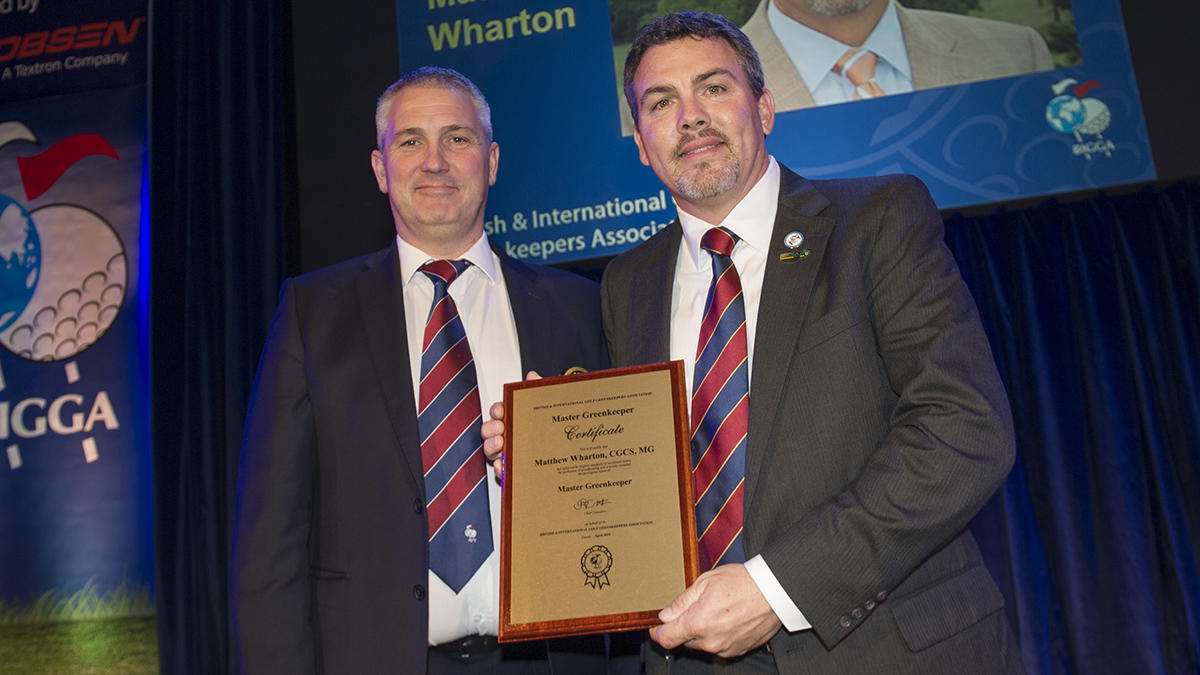- Homepage
- News and Features
- How do you measure success?
How do you measure success?

For a while now, I have considered what success really is and whether I have achieved it?
This led to several discussions with a good friend of mine, Matthew Wharton from Carolina Golf Club in the USA, which eventually morphed into us compiling a presentation that was given at BTME and then the Golf Industry Show the following month.
The idea came about after Matt and I had been discussing the pressures of being a superintendent, including how we were achieving our goals and whether we were being successful. We were both aware of the growing acknowledgement of mental health and wellbeing and thought that there was a clear connection between working towards success and the effect if was having on people in our industry.
We both felt that even though we could not claim to be experts in the field of psychology and behaviour, we believed our experience and knowledge could be shared with our peers and help assist the younger generation of turf managers coming through the ranks.
Our conversation about success continued backwards and forwards over 18 months as we explored what success really is. During that time, these discussions revived numerous memories of some of the highs and lows we had experienced in search of success, which led us to asking further questions, including:
Had we achieved success? Were we successful? How do you define what is success? and if we had achieved a certain level of success, what price had we paid for this?

What is success?
For us as turf professionals, success can be made up of small and large elements. When we work through our careers we set milestone achievements – maybe it’s the time we mow our first bullet, being responsible for leading a project or team, or promotion to that coveted first course manager role? All these are signs of success.
Success for some may focus on developing perfect turf surfaces, a pure mono‑stand grass species, constructing and maintaining the largest maintenance facility or many significant projects that take you out of your comfort zone. For some it’s hosting an event, whether local, regional, national or international like a World Cup or President’s Cup. We could also judge success by achieving the status of superintendent at one of the world’s most prominent golf clubs, like St Andrews Links or Royal Melbourne.
Gaining qualifications is something very close to my heart. I’m not alone in admitting that I left school with very little in the way of academic qualifications.
Being labelled as stupid or being categorised that you wouldn’t achieve very much wasn’t uncommon. Possibly the drive for success and recognition inspired many to achieve higher qualifications, degrees and even PhDs.
Sometimes the reference of success is misguided, as it normally refers to your work and career. However, many have struck success outside the workplace.
Sports and hobbies often enable you to measure your progress, making you feel that you are successful.
It may even be that after a long career you are able to retire early and pursue a life away from work and responsibilities, free to do whatever you want, although that’s certainly very rare.
But to achieve these ambitions, we understand that it takes an amount of dedication, skill and determination. This isn’t without its issues. Indeed, tomorrow’s manager will need to understand a greater range of knowledge and learning.
We are already seeing a huge impact surrounding legislation and restrictions with the use of chemicals and modern turf managers are having to find and navigate a new route to a solution that meets expectations.
Unfortunately, golfers’ expectations are already inflated and I’m afraid are never going to be lowered! Solutions will need to weave deeper into ever‑tightening budget controls, ensuring the champagne lifestyle can be met with beer money.
These additional issues are already being felt throughout the industry, especially in relation to labour. Many potential turf managers see these issues and opt for an easier vocation, while attracting new people into the industry to replace them is becoming increasingly difficult. There are already clear indications around the world that golf is struggling to fill positions and I’m sure there will be more than a few discussions at BTME on that very topic.
One of the solutions on the horizon may well be the use of new technology (in recent times we are starting to see the rise of automated greens and fairway mowers) that allows much more to be done on the course. Along with this, there will be the need to keep multinational, multi-gender, and multi-generational staff happy and motivated.
I have joked many times that this job should come with a serious health warning! We work unsocial hours, normally from before first light to way beyond darkness in the evening, and even taking work home. We work in all seasons, from cold and hypothermic conditions to the heat of summer where sunburn and skin cancer are major health risks. Sometimes fuelling an unhealthy lifestyle is poor nutrition, while some may develop addictions to help deal with the stresses of work. In addition to this, in an age of constantly being connected via technology and under constant pressure to produce, how we deal with stress is likely to become the number one marker for measuring success.
How many times have we heard that we treat our family as being our number one priority? But for many, including myself, we have failed miserably at it.
Unwisely, I chose a path that defined success as how my career progressed. Without realising it, this cost my relationship with my children who, now in their adulthood, feel betrayed that a golf course was far more important than they were! At a time when relationships should be strong, they are now fractured and tainted. Who said that the cost of success is paid when you make those sacrifices? Sometimes you pay the cost long after when you thought your dues were paid.
The right recipe
So, is there a recipe for success without paying a higher price? Your work and golf course will always be there, if you pay attention. Communication on all levels is key to managing an ever‑changing world. Honesty, integrity and trust through good communication is important to our teams, our line managers, members and guests. This may be through good oral communication, as well as newsletters, blogs and social media. Try to work with your teams and managers and share your responsibilities as you won’t be the only one that, at times, struggles with the needs of the business.
Involvement with your local, state or national association can help, not only on items that refer to the golf course and agronomy but building relationships with other turf professionals that are a fundamental support framework and who can assist when times are difficult. And there will be difficult times.
Don’t be ashamed to reach out for support. We all know that one of the great aspects of our industry is the camaraderie between us and many life‑long friends have been made along the journey – they will always be there to give you support.
An important lesson I have learnt is don’t sweat the small stuff. If you had £86,400 in your bank account and someone stole £10 from you, would you be upset and throw the remaining £86,390 away in the hope of getting back at the person that took your £10? Or move on and live your life? We have 86,400 seconds in every day, so don’t let someone’s negative 10 seconds ruin the remaining 86,390.
There is a delightful quote from iconic British actress Dame Helen Mirren who, when asked in an interview in 2017 what advice she would give to her younger self, she said it would be to tell people to “F‑off” more and stop being “so bloody polite”. I appreciate that this may seem unprofessional, but sometimes saying what needs to be said isn’t a bad thing!
Don’t always be the last to leave and don’t always be the one that feels they have to say ‘yes’. Being the go‑to person brings a great feeling of being wanted, but being the ‘yes’ person at everyone else’s benefit is not a great recipe.
Saying ‘no’ sometimes, at the appropriate time and in the right manner, is healthy as it stops you being used and allows you to prioritise your time.
Above all, make your personal life as important as your work life. Remember, there are friends and family that depend on you being there for them. They want you home safe and happy. Fix deadlines for when you need to finish work. There will always be occasions (like tournaments or projects) when you need to work through, but is there really the need to do it every day?
Make sure you take all your holiday entitlement. You work hard to develop a great team; you groom them, train them, give them responsibility so that you can have a break from time to time! I would hate to think any one of my team felt that they couldn’t take a holiday because they needed to be at work.
Create an environment that can support each other and enjoy life away from turf. This is fundamental mental health wellbeing, giving yourself the permission to switch off (hey, I know this is not easy). Grant yourself the time to enjoy time away from work and partake in things that make you happy and that aren’t related to work.
In many ways, course managers are a lot like airline pilots. You must look after your crew and passengers. These are your family and friends that you take along your shared journey. What’s the point of any journey? Getting to your destination safely. That means you need to constantly check the horizon for your direction, ensure that you are aware of any dangers and that you can take evasive action if required as a team.
Lastly, with all levels of success comes an element of sacrifice. Imagine an iceberg if you will. The bit sticking out the water is what everyone sees, but underneath are all the factors that underpin it – the hard work, persistence, late nights, rejection, discipline, criticism, doubts, failures, risk.
We don’t always see the scars on the people we feel are successful.
Sometimes these scars are mental ones that are never seen but felt acutely by the individual.
So, take a look at yourself, think about what is right for you and the people around you. First and foremost, look after yourself, find happiness and a level of success that fits your physical and mental wellbeing.
Author


